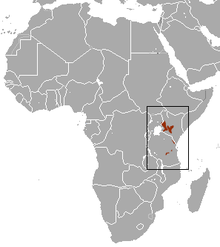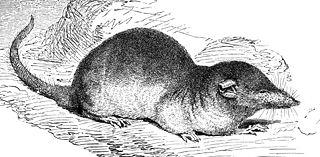
The white-toothed shrews or Crocidurinae are one of three subfamilies of the shrew family Soricidae.

The greater white-toothed shrew is a small insectivorous mammal found in Europe and North Africa. It is the most common of the white-toothed shrews. This species is found along the Mediterranean, Netherlands, Belgium, Ireland, Germany and Portugal; in addition, the Osorio shrew of the Canary island of Gran Canaria, originally described as a separate species, was later discovered to be a population of introduced greater white-toothed shrew. Furthermore, a subspecies of the greater white-toothed shrew, Crocidura russula ibicensis, is found on the Mediterranean island of Ibiza. In April 2008, the greater white-toothed shrew was discovered in Ireland as well. Its preferred habitats are grassland and woodland. It is slightly larger than the lesser white-toothed shrew but otherwise very similar and can often be distinguished only by close inspection of its teeth which are unpigmented.

The genus Crocidura is one of nine genera of the shrew subfamily Crocidurinae. Members of the genus are commonly called white-toothed shrews or musk shrews, although both also apply to all of the species in the subfamily. With over 180 species, Crocidura contains the most species of any mammal genus. The name Crocidura means "woolly tail", because the tail of Crocidura species are covered in short hairs interspersed with longer ones.
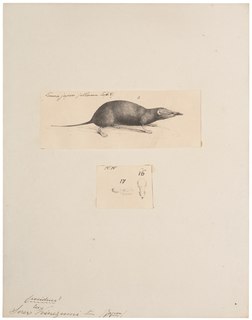
The Dsinezumi shrew, also known as the Japanese white-toothed shrew, is a species of musk shrew found in Japan and on Korea's Jeju Island. It is widespread, and considered to be of "least concern" by the IUCN.

Bailey's shrew is a species of mammal in the family Soricidae. The name honours American naturalist and museum director Alfred Marshall Bailey. It is endemic to Ethiopia. Its natural habitat is subtropical or tropical high-elevation grassland.

Crosse's shrew is a species of mammal in the family Soricidae. It is found in Benin, Cameroon, Ivory Coast, Ghana, Guinea, Liberia, Nigeria, Sierra Leone, and Togo. Its natural habitat is subtropical or tropical moist lowland forests.

The reddish-gray musk shrew is a species of mammal in the family Soricidae. It is found in Angola, Botswana, Democratic Republic of the Congo, Eswatini, Lesotho, Malawi, Mozambique, Namibia, Nigeria, South Africa, Tanzania, Zambia, and Zimbabwe. Its natural habitats are lowland forests, subtropical or tropical high-elevation grassland, and caves.

The long-tailed musk shrew is a species of mammal in the family Soricidae. It is found in Burundi, Cameroon, Central African Republic, Republic of the Congo, Democratic Republic of the Congo, Gabon, Nigeria, and Uganda.

The heather shrew is a species of mammal in the family Soricidae. It is endemic to Angola.

The Sulawesi shrew is a species of mammal in the family Soricidae. It is endemic to the central and northern provinces of Sulawesi in Indonesia. It is a fairly common species and the International Union for Conservation of Nature has assessed its conservation status as being of "least concern".

The Nicobar shrew or Nicobar white-tailed shrew is a critically endangered species of mammal in the family Soricidae. It is endemic to Great Nicobar Island in India.

The Nimba shrew is a species of mammal in the family Soricidae. It is found in Ivory Coast, Guinea, Liberia, and Sierra Leone. Its natural habitat is subtropical or tropical moist lowland forests.

Crocidura hikmiya is a species of shrew described from the rainforests of Sri Lanka, based on both morphological and molecular data. Its closest sister species is the Sri Lankan long-tailed shrew, another Sri Lankan crocidurine shrew restricted to the high-elevation habitats of the Central Highlands. C. hikmiya has a shorter tail than the Sri Lankan long-tailed shrew. Most of the other characteristics that distinguish the two species are osteological natured .
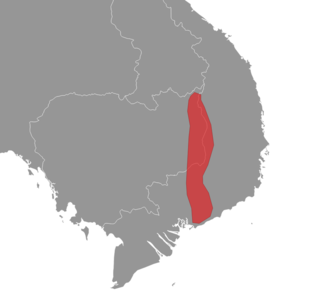
Crocidura phanluongi is a species of shrew in the genus Crocidura from southern Vietnam and nearby Cambodia. It is a somewhat small, gray shrew with an ecologically diverse distribution.

The mossy forest shrew is a species of shrew native to Indonesia.

The voracious shrew is a common and widespread species of shrew native to China, India, Laos, Thailand, and Vietnam.
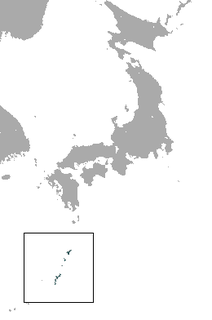
The lesser Ryukyu shrew, or Watase's shrew is a common species of shrews that is endemic to Japan. It is often found living in bushes and grasslands along the river banks and in shrubs of lower elevations.
The Banka shrew is a species of mammal in the family Soricidae. It is only known from the Bangka Island in Indonesia and possibly Sumatra. It lives in primary and secondary lowland forest and it is not clear if can adapt to human settlements such as plantations. It is threatened by forest loss for logging, expanding plantations such as palm oil and mining.
Crocidura kegoensis, also known as the Ke Go shrew or Ke Go white-toothed shrew, is a species of shrew in the genus Crocidura described in 2004. It is smaller than other Crocidura species known from Vietnam, brownish-grey in colour with black markings on the muzzle. Its hair is short. The holotype was found in the Ke Go Nature Reserve, in Vietnam's Ha Tinh province, at an altitude of about 200 m.
The Phu Hoc shrew is a species of white-toothed shrew native to the island of Phú Quốc, Vietnam. The species was first described by Abramov et al. in 2008. The species' haplogroup is most closely related to the Southeast Asian shrew and C. dracula.
